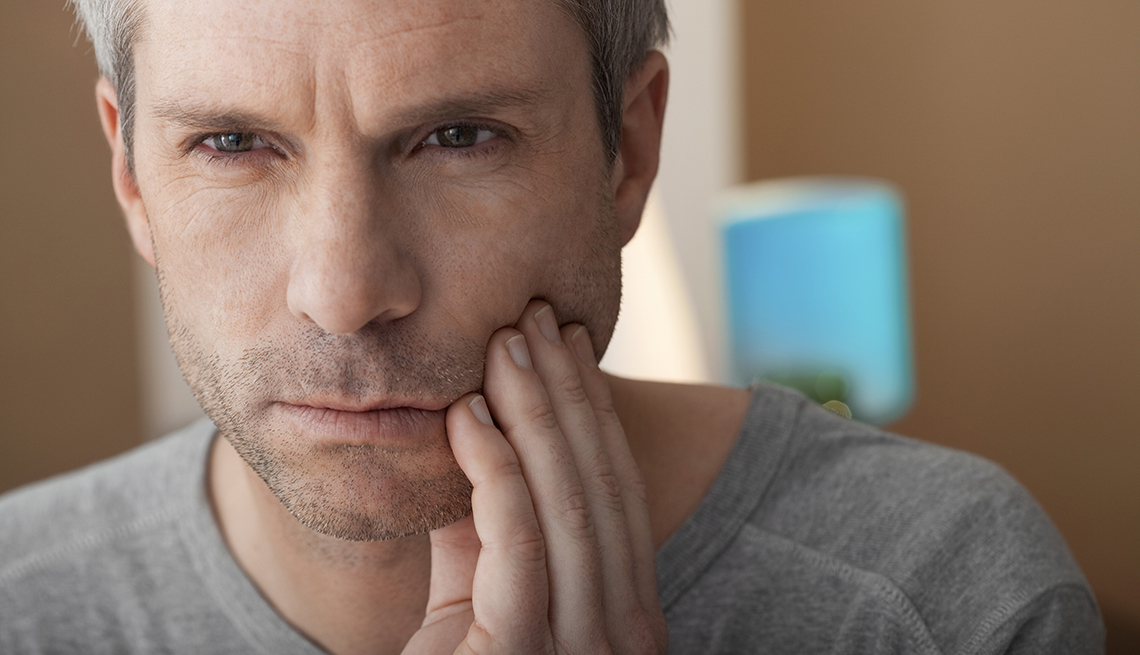
Is the coronavirus pandemic damaging your teeth?
- Select a language for the TTS:
- UK English Female
- UK English Male
- US English Female
- US English Male
- Australian Female
- Australian Male
- Language selected: (auto detect) - EN
Play all audios:

LOOK INWARD "Most people don't have the ability to switch off a trigger in their head and say, ‘OK, I'm not going to grind anymore’ — it's an automatic thing,” Jahangiri
says. To target the underlying stress that can cause grinding, Ackrill suggests deep breathing exercises (she offers her own on YouTube) or guided meditations. As she explains, things like
decreasing your breathing or heart rate can help counteract a sympathetic nervous system that is “revved up” by stress. START A BEDTIME ROUTINE Jaw movements at night are not only normal,
they can be beneficial, increasing the spread of saliva around our mouth, which protects our teeth. But if they cross the threshold into grinding, you've got problems. One solution:
Create a bedtime routine to put your brain to bed. “Think back to when you put your toddler to sleep,” says Ackrill. “You probably had a regimen to help your little one let go of the day — a
series of events that were cues to your child's brain that it was time to sleep, perhaps talking about the good things that happened that day, followed by a bedtime story.” We can do
that for ourselves, she says. Slide into a warm bath. Write in a journal. For her own wind down, Ackrill recently purchased a wireless sleep mask with headphones to pipe in soothing music,
set with a timer. BOLSTER THOSE BONES Demineralization can destroy tooth enamel and potentially weaken the entire tooth structure. Culprits include foods that generate acids — including
sugar-laden treats and fruit juice — and dry mouth, which is a common issue as people age and take more medications, Shuman says. A toothpaste with hydroxyapatite, such Boka or RiseWell, can
help remineralize tooth enamel. BRING THE HEAT Grinding in your sleep adds another six or so hours of jaw-muscle activity. When we wake up, our jaw muscles may be tender or tight because
they have been running a marathon all night. “Lactic acid builds up in the muscles when they become overstressed,” says Jahangiri “Applying a heat pad on the jaw and neck can help dissipate
some of that.” A nighttime dental guard can help with bruxism, otherwise known as teeth grinding. Getty Images CONSIDER A NIGHT GUARD Sleep bruxism is a little trickier to tame because
you're not aware of what your mouth is doing as you sleep. That's where night guards come in. Made of plastic, and usually worn on either the upper or lower choppers, “they act as
a kind of bumper for your teeth,” Jahangiri says. “Instead of the enamel of your teeth breaking down, the plastic will wear.” Only a dentist can make a night guard to precisely fit the
dimensions of your teeth. A custom-made night guard, designed from in-office impressions, can be pricey (costing, on average, $300 to $500) but, as Jahangiri points out, crowns, bridges and
other dental procedures are even more expensive. You can also go the (cheaper) over-the-counter route. Of the options, “boil-and-bite” guards are usually the best tolerated. These come with
an impression kit that allows you to put the guard in hot water to soften it. It's then placed in your mouth and sets to the shape of your teeth. This type of guard costs considerably
less (anywhere from $5 to $80) than its in-office counterparts. But it breaks down more quickly than a custom-fit guard and is best as a short-term solution. You can also find companies
online that send you a kit to make DIY impressions that you return to the guard manufacturer. Before you choose among the options, talk to your dentist. “A night guard has to fit well,” says
Messina. One made from material that is too soft will allow you to chew on it, increasing jaw muscle activity. Something that doesn't fit well and hold all of your teeth in place can
irritate the gum tissue and can even cause teeth to shift over time, which can lead to dental misery down the road.
